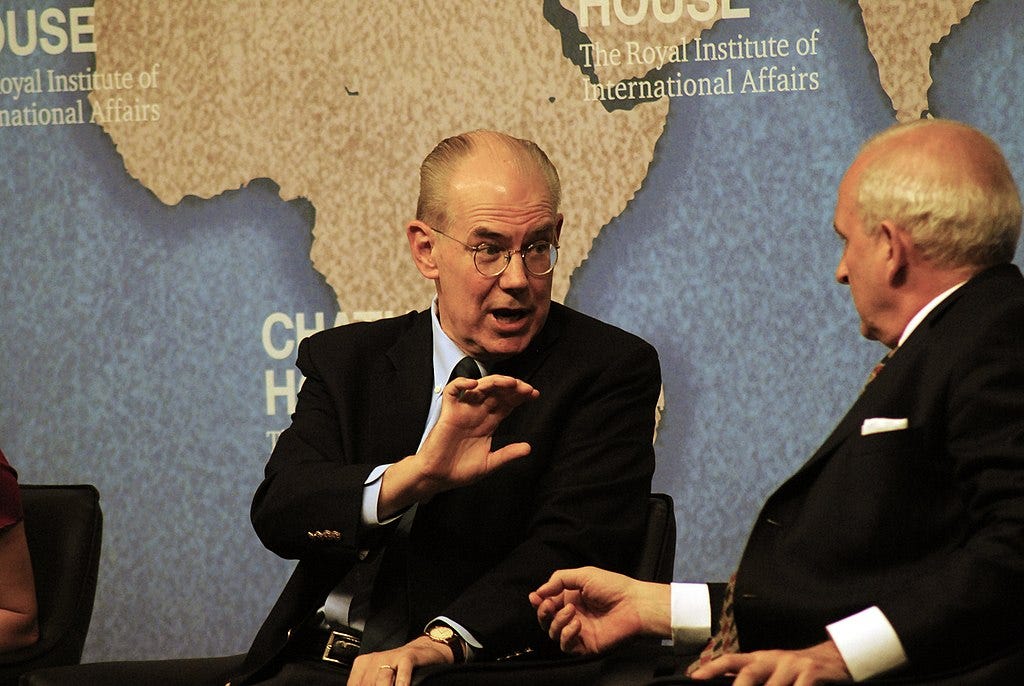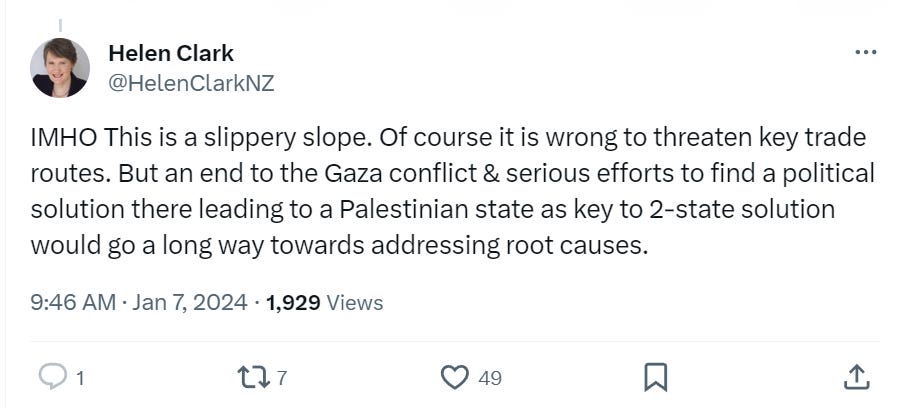Government under pressure to support SA's application at The Hague over genocide in Gaza
Legal experts urge support of South Africa instituting proceedings against Israel, while one scholar says lack of sanctions and boycotts helped create the current catastrophe.

A signatory to a letter demanding the New Zealand Government support South Africa’s application initiating proceedings at The Hague against Israel for genocide says the brief is exceptionally detailed and documented, as well as heartbreaking.
Auckland University’s Emeritus Professor of Law Jane Kelsey also says failure to support sanctions and boycott actions have precipitated the catastrophic situation Palestinians are now in.
Ten legal experts and leading academics last week sent on open letter to Prime Minister Christopher Luxon, Foreign Minister Winston Peters, Justice Minister Judith Collins and Attorney-General Paul Goldsmith calling on them to join a growing number of nations supporting the 84-page document outlining the case against Israel.
The application by South Africa is set to be heard on January 11 (local time) at the International Court of Justice (ICJ) in the Netherlands, the United Nation’s primary judicial organ comprised of 15 elected judges.
The application argues that “acts and omissions by Israel . . . are genocidal in character, as they are committed with the requisite specific intent… to destroy Palestinians in Gaza as a part of the broader Palestinian national, racial and ethnical group” in breach of its obligations under the Genocide Convention”.
Last week’s open letter, which Kesley co-signed, stated: “We understand the diplomatic sensitivities involved in these proceedings. We ask that New Zealand steps up, in a principled way, as this Government did when it debated a parliamentary motion on steps towards a ceasefire in Gaza ahead of its Five Eyes partners.
“New Zealand could express its support for the request for provisional measures, as Turkey and Malaysia have done, or it could seek to intervene in the case.”
Malaysia, Jordan and Turkey are supporting nations in the proceedings against Israel for committing genocidal acts against the Palestinians.
Other signatories to the letter to the government included human rights lawyer Frances Joychild KC and Auckland University Professor Emeritus of law, David Williams.
Kelsey, told In Context the Genocide Convention, which came into effect in New Zealand in 1978, meant New Zealand was obliged to prevent acts of genocide and that the brief submitted by South Africa presented evidence of both genocidal intent and actions by Israel in Gaza.
She said Government must now “seek to prevent a continuation of these acts of genocide” by supporting the application.
“That is what’s motivating South Africa and should be motivating New Zealand. Those obligations rest equally on Israel to stop senior officials and others who are advocating, inciting and perpetuating genocide. At this stage what is required is that the obligation on SA – and NZ if it joined - to prevent genocide is “plausible”. The 84-page SA brief is exceptionally detailed, supported by extensive documentation and referencing, including from many official UN sources, as well as heart-breaking. SA notes that this goes beyond what is normal at this stage but reflects the need to expedite the process and to require Israel to provide substantive and detailed responses to justify its rejection of allegations of genocide. It is more than ‘plausible’.
South Africa being the first nation to invoke the 1948 Genocide Convention comes as no surprise. The African National Congress (ANC), South Africa’s ruling party, has maintained strong relationships with Palestinian groups over several decades, its military wing uMkhonto we Sizwe having waged an armed struggle as part of efforts to topple its country’s own racist apartheid state.
Kesley said an absence of the kind of non-violent action by countries that had helped bring down the South African apartheid regime in the early 1990s had accounted for the situation Palestinians now faced.
“Anti-apartheid measures like boycotts and sanctions, which are long-term pressure points that cannot deal with the urgency of the current crisis, although failure to support those measures has precipitated where we are,” she said.
“New Zealand has stood with the people of South Africa against apartheid in the past and we have a moral, as well as legal, obligation to do so again.”
The Ministry of Foreign Affairs and Trade (Mfat) told In Context last month it would not be banning the import of goods from illegal settlements in the occupied West Bank, even as settlers and army stepped up violent displacement of Palestinians and land thefts. Last year, at least 488 Palestinians were killed and nearly 13,000 wounded by Israeli forces and settlers there.

South Africa submitted its application on December 29 amid warnings for several weeks prior by human rights groups and legal experts that a genocide was unfolding as Israel imposed a siege and began bombing civilian targets, including bakeries, hospitals and residential buildings. It has now displaced 2 million Gazans and killed approximately 23,000 people, mostly women and children.
UN Special Rapporteur for Gaza Francesca Albanese told In Context in November Israeli had declared its genocide intent early on and that subsequent dynamics of violence in Gaza demonstrated acts of genocide. Other UN rapporteurs had sounded warnings of the unfolding genocide since October.
Kesley said international law was an imperfect instrument, but was one of the few available, particularly since US had blocked any effective action at the United Nations. The US has consistently voted against motions calling for an immediate ceasefire.
White House National Security Council spokesman John Kirby has called the application before the UN’s judicial court “meritless, counterproductive, and completely without any basis in fact whatsoever”.
News site Axios has stated it obtained a diplomatic cable from the Israeli Foreign Ministry instructing its embassies to urge diplomats and politicians in the country’s they are based to denounce South Africa's case. It said the cable showed Israel’s strategic goal was to stop an injunction against continuing its operation in Gaza while the case was being heard and ensure enough political pressure was exerted on the ICJ so that it refrained from determining whether genocide was taking place in Gaza.
However, a growing number of influential legal experts and scholars are now calling Israel’s actions genocide.
University of Chicago political scientist John Mearsheimer said last week he believed Israel had created the conditions calculated to bring about the destruction of a part of the Palestinians people, in clear breach of the Genocide Convention, which Israel was subject to as a member of the United Nations.

“I believed Israel was guilty of serious war crimes — but not genocide — during the first two months of the war, even though there was growing evidence of … ‘genocidal intent’ on the part of Israeli leaders,” he said.
“But it became clear to me after the 24-30 November 2023 truce ended and Israel went back on the offensive, that Israeli leaders were in fact seeking to physically destroy a substantial portion of Gaza’s Palestinian population”.
The majority of displaced Gazans have been corralled against the strip’s southern border with Egypt, with Israel officials pushing for their displacement into the Sinai desert and elsewhere. There have been reports of secret talks between the Congo and Israel over sending Palestinians to the African state as part of a “voluntary migration scheme”.
New Zealand’s coalition government has signalled an intent to align even closer with US foreign policy settings than previous Labour-led governments, particularly in Asia-Pacific, where its military may operate under ‘pillar II’ of Western military alliance AUKUS in preparation for a war with China.
Supporting South Africa’s ICJ case represent a radical departure from helping to shore up the so-called “rules-based international order”, as it would run contrary to US hegemonic interests in the Middle East, where the US funds and gives unequivocal backing to Israel’s colonial-settler state. The US congress in November approved a military aid package to Israel worth nearly US$14.5 billion, even as it continued to indiscriminately bomb Gaza.
The New Zealand government has failed to call for an immediate ceasefire, only urging all sides to “create the conditions” to make a ceasefire possible, a diplomatic nod to Washington’s position.
The Ministry of Defence also confirmed to In Context it had been asked to join the US-led naval alliance in the Red Sea, Operation Prosperity Guardian, assembled to confront Yemen’s Houthis blockading shipping routes to Israel and attacking ships using the route.
The Houthis are staging their action in support of Palestinians in Gaza. The New Zealand government said it was still deciding on whether to assist the naval alliance and would not comment further.
The southern Red Sea brings freight vessels to and from Asia and Europe via the Suez Canal, accounting for up to 15 percent of global trade annually. Shipping giants Maersk have said they will avoid the Red Sea routes for the ‘foreseeable future’, using alternative, longer routes around Africa instead.
Last week, the government co-signed a statement alongside 10 other nations warning the Houthis will “bear the responsibility of the consequences should they continue to threaten lives, the global economy, and free flow of commerce in the region's critical waterways”.
Former New Zealand Prime Minister Helen Clark expressed concern about the statement. She called it “a slippery slope” and urged a political resolution to address the underlying causes of Houthi attacks.
Meanwhile, Foreign Minister Winston Peters talked with US Secretary of State Antony Blinken on January 5, discussing conflicts in the Middle East and Ukraine, as well as US efforts to maintain its hegemonic primacy in Asia-Pacific.
Palestine Solidarity Network Aotearoa chairman John Minto said Peters’ uncritical shared foreign policy settings with the US and apparent disregard for Palestinian lives amounted to cultural bias and racism.
“This anti-Palestinian racism also runs through the US-instigated statement condemning attacks on Israeli shipping in the Red Sea, which New Zealand has signed up to despite the statement’s refusal to acknowledge the reason for the attacks – Israel’s genocide against Palestinians in Gaza,” he said.
A public hearing at the United Nation’s judicial court in the Hague’s Peace Palace will take place on January 11 (local time), where the South Africa’s request for provisional measures to protect Palestinians from further harm will be considered. Israel will respond to the application on January 12.
The hearings will be streamed live on the ICJ’s website and on the UN Web TV.





Many thanks again Mick for bringing the issues that should concern all of us back home to Aotearoa /New Zealand. We need to keep pressuring our government to support South AFRICA, Malaysia and Turkey with the ICJ and the call of genocide against Israel. Keep up the good work.
Even if the ICJ departs from its normal policy of doing nothing to offend the United States and its western allies, Israel will ignore any ruling made against it, and as usual the US will back the State of Israel. Contrary to the popular mantra that "there can be no military solution to the conflict" in fact there can be nothing but a military solution, even if that is followed up by a political settlement. The Yemeni authorities recognise that words or court rulings will not stop the genocide, and that is why they are regulating commercial shipping in the Red Sea to stop the passage of any goods which will directly or indirectly assist the genocide. The Realm of New Zealand, on the other hand, supports the genocide and opposes the Yemeni attempts to frustrate Israeli and US actions aimed at destroying the Palestinian population of Gaza and expelling them from the territory. New Zealand does not actually adhere to the principle of freedom of commerce on the seas, because it has supported or condoned maritime blockades of many other nations, such as Korea, Iran, Cuba, Yemen and Venezuela. New Zealand's sole interest is in supporting Anglo-American global hegemony, and if that requires an occasional dose of genocide against recalcitrant peoples, then so be it.